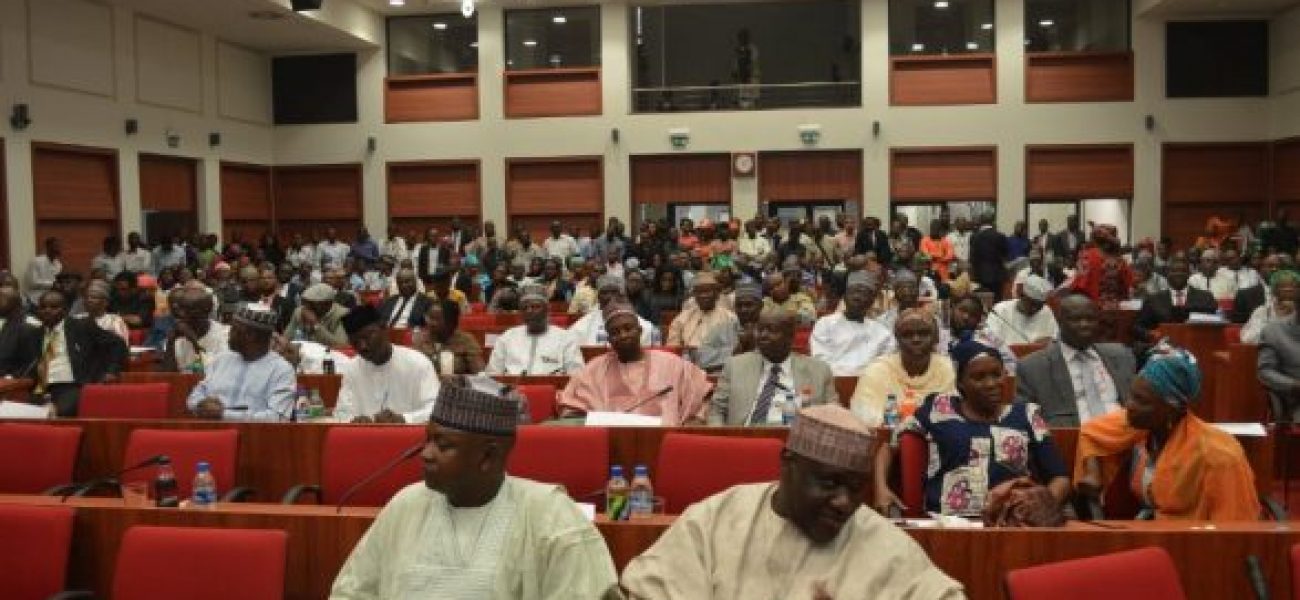The 8th National Assembly achieved a major milestone on Monday 13th February when it began its three -day public hearing on the 2017 budget. It is the first time that the national budget has been open to public debate since Nigeria’s return to civilian rule in 1999. The public hearing, which was organised by the National Assembly’s Joint Committees on Appropriations in collaboration with the Policy and Legal Advocacy Centre (PLAC) with support from the British Department for International Development (DFID), was aimed at making the budget process more inclusive by creating a platform for deliberation, analysis and public discourse on the budget policies. The hearing was also intended to initiate discussions on the fiscal financial and economic assumptions used at arriving at the total estimated expenditure in the 2017 budget.
The platform provided an avenue to debate the key assumptions that the N7.3 trillion budget is premised on such as the oil benchmark price of $44.5 per barrel, oil production rate of 2.2 million barrels per day and an average exchange rate of N305 per 1 US dollar. Of the total amount allocated in the budget, the recurrent expenditure of N2.978 trillion remains the highest allocation with ramifications for Nigeria’s growth and development. N2.0 trillion was allocated for capital expenditure, N1.66 trillion for debt servicing, N419 billion for statutory transfers with N177.40 billion as sinking funds to retire maturing bonds.
Some of the budget policies contained in President Buhari’s budget speech include zero based budgeting, local production, refinement of petroleum products, engaging communities in the Niger Delta to reduce disruption to oil production, development of agriculture and mining sectors, encouraging small and medium scale enterprises and job creation. However, it was pointed during deliberations that the allocation to Agriculture in the 2017 budget which represents 1.69 percent of the total budget ( N123,440,807,622) and an increase of 37.8 percent from the 2016 budget, remains a far cry from the government’s commitment of 10% of the annual budget to agriculture as contained in the Maputo declaration. It was also noted that the allocation to education in the 2017 budget (N540 billion) which is an increase from the N369 billion is insufficient in real terms when compared to the proportion of the national budget that other African countries like Burundi, Benin, Ethiopia and Madagascar spend on the sector.
Some other areas highlighted during the hearing included the lack of harmonisation of monetary and fiscal policies, an appropriate metering system for oil production and lifting, setting a debt limitation for the three tiers of government, need for gender and youth inclusivity, a call for the quick passage of the Petroleum Industry Bill and a budget prioritised in accordance with its development challenges. It was also made clear that the early approval of the Medium Term Expenditure Framework (MTEF), early budget implementation, budget implementation and the strenuous procurement procedure would have to be addressed if successive budgets are to make any real impact.
Importantly, the budget hearing marks a departure from previous traditions where the budget was largely seen as the sole prerogative of the Executive and the Legislature and appeared to be clouded in a culture of secrecy. The opening of the 2017 budget to public debate is arguably a laudable attempt to give legitimacy to the present budget in a bid to readdress and distance the allegations of “budget fraud” and “insertions” which trailed the 2016 budget.
It has been argued that the lack of transparency in the budgetary process exposes it to corruption and frivolous expenditures. Therefore, opening it up to civil society, media and other stakeholders has potentials for strengthening the Legislature on carrying out oversight of the budget.

